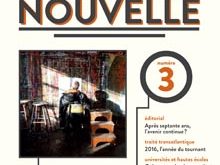 “Man is not alone in the universe” is a catchphrase among UFO enthusiasts. It is usually uttered in a quivering, slightly reproachful tone, probably meant to induce a brooding sense of an unknown world lurking somewhere out there. A world that is closing in on us, while we – at least most of us – remain oblivious.
“Man is not alone in the universe” is a catchphrase among UFO enthusiasts. It is usually uttered in a quivering, slightly reproachful tone, probably meant to induce a brooding sense of an unknown world lurking somewhere out there. A world that is closing in on us, while we – at least most of us – remain oblivious.
There is nothing really wrong with the curiosity of UFO enthusiasts to explore extra-terrestrial life. But it is tempting to point out that we may just as well start digging where we stand and confront the fact that mankind is not alone on our “own” planet either – although two thousand years of western thought suggest precisely that.
Running throughout the canon of philosophical and political theory, from Aristotle and the Bible to Habermas and Rawls, is the assumption of the exclusiveness of man. Humankind – or some fraction thereof, such as “free citizens of Athens” or “adult males” – is seen as the only subject worth considering, while other life forms are reduced to objects of human conquest and sustenance or, at best, seen as resources, capital to manage.
Today, this cornerstone of western thinking is being challenged by a current of ideas sometimes somewhat bluntly labelled “posthumanism”, although Sarah Whatmore, professor of environment and public policy at Oxford University, has given it the more sympathetic term “more-than-humanism”.
“More-than-humanism” questions the consequences of the European Enlightenment’s humanistic reinterpretations of maxims such as “behold the man” (ecce homo) and “man is the measure of all things”. The main purpose of Enlightenment humanism, whose words of wisdom still generate by default nods of approval from most well-meaning intellectuals on the Left, was to offer a world order that could serve as a counterweight to religious blindness to the potential of human beings – a way of broadening the “circle of warmth” of ethical responsibility.
According to supporters of “more-than-humanism”, non-human living things paid the price for this expansion of human solidarity. They were dismissed as inferior objects and placed outside the strict boundaries of the ethical and political circle of warmth. In order to endorse solidarity between souls harboured in human bodies, the call to “behold man” appears, in turn, to have required the establishment of an intense blindness towards the needs and potentials of other creatures. Traditions of thought and peoples that did not share this central elevation of man above nature, that “naively” could not comprehend this obvious hierarchy and brought together elements that, according to the cosmic order, must remain apart, were branded as “primitive” or “barbaric”. Spinoza, perhaps the classical philosopher who came closest to an alternative view of the world, was banished by Catholics as well as Jews because of his unsuitable thinking.
The idea of humans’ unique position as political and ethical subjects appears to be so firmly rooted in the western tradition of thought that even a contemporary, radical political philosopher like Jacques Rancière refuses to as much as toy with the idea of looking beyond this dogma. Rancière’s own work describes how the political subject has expanded historically through a process where beings, previously dismissed for producing nothing but pointless “sounds”, eventually have come to be seen as being capable of meaningful communication and of holding a legitimate “voice”. Rancière shows how this group of (human) beings over time has come to include slaves, women, people of different skin colour, etc. But in response to the direct question whether, for instance, animals might be included in this group, Rancière answers bluntly, “No”. Why? Because animals cannot partake in direct, rational discussion.
The imagined philosophical dividing line between entities worthy of a place within the “circle of warmth” and those placed outside of it appears to be language. Rancière’s dismissal may be understood as the most recent in a long series of increasingly desperate attempts to find an essential dividing line between human beings and “the other” creatures, dating back to Aristotle, the Bible and further back still, a line that has been proven to be highly porous and in a strong state of flux, not least by Rancière himself. Time and time again, the distinctions upon which various thinkers have based humankind’s exceptional status as uncontended masters, categorically separated from and superior to nature, have crumbled under scrutiny.
But what would actually happen if we were to relinquish our quest in finding the one philosophical cornerstone to finally separate humans from other beings on the planet? If we were to cease our efforts to maintain the strict dividing line between what is “human” and the rest of the world? Or perhaps even more radically: What if we were to forward the hypothesis that this very division is one of the most important contributing factors to the threat of impending doom that humankind faces today? Where would we wind up? Would such a perspective mean that we are passing the last checkpoints, collectively relapsing into the darkness of barbarity and driving the last nail into the coffin of civilisation? Or could it be the very thing that saves it?
Contrary to the alarmist critique directed towards this current of ideas, more-than-humanism, too, involves beholding man – but as a relational creature whose genesis, existence, and development are forever linked to and dependent on a limitless jumble of connections to a “significant otherness” – an image that even Darwin invoked, noting that “we may all be netted together”. This insight has started to evolve into a broader, “new political ecology”, which is what Bruno Latour has termed this intellectual movement. Latour, who increasingly stands out as one of the most versatile and significant thinkers of our time, has begun, in dialogue with other central figures in this sphere of thought – including Donna Haraway, Isabelle Stengers and, perhaps primarily, Michel Serres – to outline the idea of a new human attitude towards our surrounding world. The approach is based on the idea that we, as human beings, are individual and collective creatures that are “always already” tied to, and reliant on, broader contexts beyond ourselves.
According to these significant thinkers, a new political ecology must rid itself of ingrained notions about a pristine and harmonious “nature” set against a destructive humanity armed with technology. Instead, it should focus on actual possibilities of building a sustainable future that is seen neither in terms of mankind’s mastering of nor submission to such an imagined “natural” order. They oppose the established “deep ecology” view of the world that venerates an allegedly natural order to which mankind putatively must succumb, and want to emphasise a form of exploration, experimentation, and genesis that sees mankind neither as a manifest master of an environment that is in itself pointless, nor a destructive parasite living off an inherently harmonious natural order. It is a perspective that does not depart from any dream of an “indigenous natural state”, but rather sees the world as a dynamic process of interactions and temporarily stable states, some lasting no more than a brief moment – others long enough to constitute geological eons – but they are never eternal or indigenous.
The new political ecology is thus emerging from a call for greater humility toward the world and all the life forms it may hold, both literally and figuratively. Rather than contrasting mankind to nature and the rest of the world, this perspective consistently perceives humans as relays in a dynamic mélange of relations that can be more or less open, inclusive, and stable over time, but without any preordained knowledge about how these relations may develop or change.
This new type of political ecological perspective causes humanism’s one-sided ethical and political focus on human individuals to branch out into two directions, which Sverker Sörlin, professor of environmental history, currently tied to the Royal Institute of Technology in Stockholm, recently suggested in the Swedish journal Fronesis. The first direction is headed outwards towards a wider planetary interface; the second direction is headed inwards, towards the problematic bundle of tangled cultural and biological relations that in various ways have come to be categorised as the essence of mankind. Freud’s famous quote, “the ego is not master in its own house”, does take on entirely new meaning when taking into account the fact that the human genome is found in no more than ten per cent of the cells constituting a human body, while the remaining ninety per cent are made up of bacteria, fungi, protists, etc. According to the biologist and professor of feminist theory and technoscience, Donna Haraway, this implies that humans are “vastly outnumbered” in relation to their “tiny companions”. Or perhaps more accurately, “to be one is always to become with many”.
Classical psychology and sociology have explored this fact in the sense that humans are formatively dependent on each other, but Haraway and her colleagues want to broaden this perspective to show that humans are inherently shaped through interaction with other species as well. For instance, Anna Tsing has pointed out that “human nature is an interspecies relationship” where the human psyche during a short period of time is a guest in, and a result of, the tangle of relations between heterogeneous materials and organisms within and outside of our bodies, forming what we chose to label “human beings”.
On a planetary level, the new political ecology may, for instance, take the form of Michel Serres’ thoughts on a natural contract. First published in 1990, it has now begun to show real political and legal impact. Serres’ views are in many ways closely related to James Lovelock’s 1960’s Gaia hypothesis and the cluster of ideas that is now developing in relation to the Anthropocene concept. Serres notes that we have reached a historical point in time where there is no denying that planet earth must be seen as a collective project; the existence of mankind depends on something we simultaneously hold the capacity of destroying, which means that we must now learn how to master our mastering.
Considering the way in which the western legal tradition has evolved, the conclusions subsequently drawn by Serres are quite consistent, yet highly original and radical. In the light of the growing insight that the planet, through its global response to local human actions, is becoming “a de facto partner” in the overall destiny of mankind, we as humans have in various degrees, and often rather unconsciously, started to view what we term “nature”, not merely as a legal object, but as a legal subject as well – a subject with interests worthy of respect and protection. Serres declares that it is time for us to fully grant our non-human surrounding world basic legal recognition.
An interesting example of concrete developments following the lines of Serres’ thoughts is the new constitution of Ecuador, which was passed by an overwhelming majority in a 2008 referendum and is now beginning to be put into judicial practice. It states that “nature” has the legal right to “exist, persist, maintain and regenerate its vital cycles, structure, functions and its processes in evolution”. The law states that anybody has the right to represent nature in court, should any of its rights be threatened.
Particularly interesting is the fact that the constitution does not propose “nature” as a category distinct from “culture” or mankind. Instead, it explicitly views humankind as part of broader ecological systems, and also acknowledges the right of humans to enjoy sumak kawsay, “a good life”, although the understanding is that such a life is possible only through sustainable interaction with the environment. Similarly, the constitution is not based on a static view of nature, but rather on the idea that man and nature co-exist in an endless evolutionary interplay. Thus, the purpose appears not to be to submit humankind to a supposedly harmonious, indigenous nature, but to secure a constructive and sustainable interaction over time between humans and our surroundings, and to nurture a view of mankind as “always already in” nature.
The new political ecology thus appears to bring about a new type of environmental policy, which Helga Nowotny has termed the politics of “the expansive present” and where the basic premise is not a vague threat of impending doom. Instead, it is a policy that broadens the set of creatures and beings we consider ourselves obliged to consult and acknowledge in our decision-making processes, here and now. This is a type of policy that is both dependent on, and a result of, what Emilé Hache and Bruno Latour have described as a moral sensitisation towards other, non-human creatures. It requires that we as humans, without bias or blinders, highlight and scrutinise the ecological systems that we are a part of, that shape us, and that we, in our time, are dependent on – a way of living and thinking ecologically here and now, not solely a response rooted in the fear of some vague climatic holocaust in an uncertain future.
This altered way of thinking does not necessarily need be established on a societal macro level; it could just as well be anchored in micro practices through which new forms of thought and concepts may emerge, enabling a re-evaluation and a new way of understanding the place humans and other creatures/beings hold on earth, and to what extent “we” are not only dependent on “them”, but inextricably tied to them. If we do not respect, value, and give ‘them’ room, we are failing to respect ourselves as humans. It is thus a political perspective that nevertheless puts humankind in the centre of things, but in a world inhabited by myriad other creatures and beings to which our destiny as a species is intimately linked. In turn, they rely on us for their future existence as much as we rely on them.
What concrete political standpoints could such thinking underpin, and in what way could they inspire a new agenda for the Left? Among the stances implicitly or explicitly prerequisite for the new political ecology are:
– The need to broaden the acknowledged “the circle of warmth” for ethical, political, and legal subjects. This would call for an effort to further expand and deepen the solidarity between different types of beings, human as well as non-human.
– To highlight mutual needs, to stop nurturing fantasies about unitary, sovereign, and independent subjects, regardless of whether these are portrayed as a rational individual, a “culture”, a nation, or a species, and to focus on processes of becoming-together instead.
– The ambition to recognise differences, but beyond fantasies about symmetry, i.e. the idea that all beings have the same capabilities. Instead, we must acknowledge the fact that different life forms have different needs, a fact that requires a new emphasis on collective caring in systems of mutual dependence where the different heterogeneous members never can never be entirely equal, but are nonetheless dependent on one another’s care and responsibility.
– A mobilisation for collective action and an examination of the line between individual and mutual issues, without ever taking that line for granted. This also involves collectively exploring and establishing political priorities that cut across traditional societal categories and dividing lines, mobilising the public and experts, and every imaginable, and not yet imaginable, tool a representative and participatory democratic system has to offer.
In response to a question how, in his view, a position on the left differs from one on the right, Gilles Deleuze stated that a leftist perspective, in essence, requires an active way of thinking, a questioning of the given, while the right tends to strive to accept the given state of things, the issues and the future prospects that are “already on the table”. A quick review at the political standpoints mentioned above suggests that none of them have been vital concerns or key issues of the right historically. These topics, solidarity, mutuality, acknowledgment, democratic mobilisation, are – in their broadest sense – core issues of the Left.
In order to truly embrace the insights of more-than-humanist thinking, all Swedish political parties on the Left must rethink their current positions in practically every single political area. It would require a shift in the worldview and in the fundamental analytical framework that would affect not only educational politics and its core values, but consultative procedures and the considerations taken in city planning and infrastructural policy, financial policies over time, and the methods and purposes of long-term investigations as well. This would also involve an entirely new type of environmental protection policy that does not focus so much on preservation-destruction as it does on creating conditions for a sustainable co-existence among species. Interesting and inspiring experiments in this vein have already been carried out by, for instance, Sarah Whatmore in her work developing flood-proofing in England, and by Isabelle Stengers in the so-called GeCo project, but the challenges of finding ways in which to implement these types of experimental micro practices on a broad political scale remain to be faced.
On a more basic, legislative level, it would be wise to follow the Ecuadorian example, thus legally securing all political deliberations and decisions to be made through attentive interactions, taking into account interests other than narrowly formulated human ones. Whether the best way to achieve this is through an arduously realised constitutional amendment or through some other, more creative political solution is still an open matter.
To enable the political agenda of the Left to take on this route, we must dare to let go of the deeply ingrained perception that we can never “know what they want”. Obtaining reliable testimonies from non-human individuals and groups does need not be more difficult than collecting trustworthy and legitimate testaments from strictly human collectives such as “the citizens” or “the local residents”. On the contrary, it may even be easier as long as we are prepared to venture outside the framework of what we currently perceive as meaningful forms of communication. This implies putting greater effort into trying to decipher signals and messages that go beyond spoken and written language – something anyone who has a dog or a toddler does on a daily basis. We would no longer need to ask ourselves the question, “If nature could speak, what would it tell us?” Instead, we might realise that myriads of creatures and beings are speaking to us all the time – we just need to learn how to listen properly.

 “Man is not alone in the universe” is a catchphrase among UFO enthusiasts. It is usually uttered in a quivering, slightly reproachful tone, probably meant to induce a brooding sense of an unknown world lurking somewhere out there. A world that is closing in on us, while we – at least most of us – remain oblivious.
“Man is not alone in the universe” is a catchphrase among UFO enthusiasts. It is usually uttered in a quivering, slightly reproachful tone, probably meant to induce a brooding sense of an unknown world lurking somewhere out there. A world that is closing in on us, while we – at least most of us – remain oblivious.



